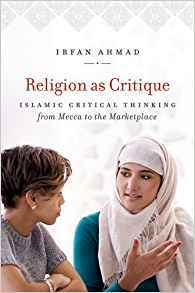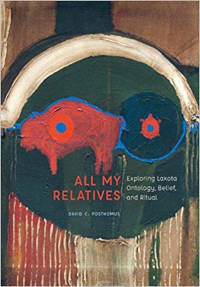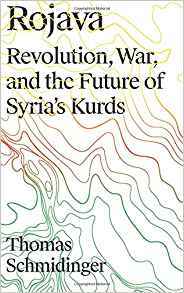After a short break, we’re back with another round up of the best new author interviews from our podcasting heroes New Books in Anthropology. This month there are 6 discussions ranging from creationism to Islamic critical thinking, Lakota ontology to Rojava revolutionaries, and Israeli bureaucracy to violence in film.
 Religion as Critique: Islamic Critical Thinking from Mecca to the Marketplace
Religion as Critique: Islamic Critical Thinking from Mecca to the Marketplace
by Irfan Ahmad
(University of North Carolina Press 2017)
In the last few decades, questions relating to Islam’s compatibility with liberal secular democracy, or the question of why Islam remains incompatible with Western liberal norms of thought and politics have generated considerable commentary in both scholarly and journalistic communities. Among the central assumptions driving such compatibility talk relates to Islam’s allegedly inherent incapacity for critique, a virtue often heralded as a signature achievement and characteristic of liberal secularism. Irfan Ahmad’s Religion as Critique: Islamic Critical Thinking from Mecca to the Marketplace (University of North Carolina Press, 2017) represents a devastating indictment of this dominant liberal assumption that Islam is inimical to critique. Turning this assumption on its head, Ahmad combines historical, textual, and ethnographic methods to argue that critique is and has always been central to Muslim intellectual thought and lived practice. The distinctive feature of this book is the way it fluctuates the camera of analysis between a genealogy of Western liberal discourses of critique as a way to puncture their universality and inevitability, while bringing into view alternate logics and imaginaries of critique in Muslim thought and practice, past and present. Eminently readable, this book will be widely discussed and debated in multiple fields, including Religious Studies and Islamic Studies.
Interview by SherAli Tareen
Listen here!
 Ark Encounter: The Making of a Creationist Theme Park
Ark Encounter: The Making of a Creationist Theme Park
by James S. Bielo
(New York University Press 2018)
In his new book, Ark Encounter: The Making of a Creationist Theme Park (NYU Press, 2018), James Bielo, Assistant Professor of Anthropology at Miami University, goes behind the scenes at Grant County, Kentucky’s creationist theme park, which opened in July 2016. Entertainment has long been understood as important aspect of Christianity in the US, but the theme park, which includes a re-creation of Noah’s ark, provides a striking setting through which to ask questions such as how creationists present their beliefs to the broader public. Ark Encounter is, in part, a workplace ethnography, which describes the entwined conceptual and aesthetic work through which the park’s design team imagine how to most effectively and playfully communicate a controversial religious perspective.
Bielo’s findings are situated in discussion with other groundbreaking anthropological work on how categories such as ‘fundamentalist’ have been constructed over time, perhaps most notably Susan Harding’s scholarship. While the whole book is ethnographically rich and reflexive, an appendix describes in useful detail (for both readers and for those planning or currently engaged in their own research projects) the processes through which Bielo entered – and left – his fieldsite.
Interview by Siobhan Magee
Listen here!
 Wrapped in the Flag of Israel: Mizrahi Single Mothers and Bureaucratic Torture (Revised Edition)
Wrapped in the Flag of Israel: Mizrahi Single Mothers and Bureaucratic Torture (Revised Edition)
by Smadar Lavie
(University of Nebraska Press 2018)
In Wrapped in the Flag of Israel: Mizrahi Single Mothers and Bureaucratic Torture (Revised Edition) (University of Nebraska Press, 2018), Smadar Lavie analyzes the racial and gender justice protest movements in Israel. She suggests that Israeli bureaucracy is based on a theological notion that inserts the categories of religion, gender, and race into the foundation of citizenship. In this revised and updated edition Lavie connects intra-Jewish racial and gendered dynamics to the 2014 Gaza War, providing an extensive afterword that focuses on the developments in Mizraḥi feminist politics and culture between 2014 and 2016 and its relation to Palestinians.
Interview by Yacoov Yadgar
Listen here!
 All My Relatives: Exploring Lakota Ontology, Belief, and Ritual
All My Relatives: Exploring Lakota Ontology, Belief, and Ritual
by David C. Posthumus
(University of Nebraska Press 2018)
In All My Relatives: Exploring Lakota Ontology, Belief, and Ritual (University of Nebraska Press, 2018), David C. Posthumus, Assistant Professor of Anthropology and Native American Studies at the University of South Dakota, offers the first revisionist history of the Lakotas’ religion and culture in a generation. He applies key insights from what has been called the “ontological turn,” particularly the dual notions of interiority/soul/spirit and physicality/body and an extended notion of personhood, as proposed by A. Irving Hallowell and Philippe Descola, which includes humans as well as nonhumans. All My Relatives demonstrates how a new animist framework can connect and articulate otherwise disparate and obscure elements of Lakota ethnography. Stripped of its problematic nineteenth-century social evolutionary elements and viewed as an ontological or spiritual alternative, this reevaluated concept of animism for a twenty-first-century sensibility provides a compelling lens through which traditional Lakota mythology, dreams and visions, and ceremony may be productively analyzed and more fully understood.
Posthumus explores how Lakota animist beliefs permeate the understanding of the real world in relation to such phenomena as the personhood of rocks, ghosts or spirits of deceased humans and animals, meteorological phenomena, familiar spirits or spirit helpers, and medicine bundles. All My Relatives offers new insights into traditional Lakota culture for a deeper and more enduring understanding of indigenous cosmology, ontology, and religion.
Interview by Ryan Tripp
Listen here!
 Violence’s Fabled Experiment
Violence’s Fabled Experiment
by Richard Baxstrom and Todd Meyers
(August Verlag 2018)
Richard Baxstrom and Todd Meyers are anthropologists who have an interest in studying film for its value in a way to view the world. In Violence’s Fabled Experiment (August Verlag, 2018), they examine three filmmakers: Werner Herzog, Joshua Oppenheimer, and Lucien Castaing-Taylor. Each artist is known for interesting, but controversial films that feature violence in different ways. In the book, Richard and Todd both critique and praise the importance of each and their methods and subjects.
Interview by Joel Tscherne
Listen here!
 Rojava: Revolution, War and the Future of Syria’s Kurds
Rojava: Revolution, War and the Future of Syria’s Kurds
by Thomas Schmidinger
(Pluto Press 2018)
Thomas Schmidinger‘s Rojava: Revolution, War and the Future of Syria’s Kurds (Pluto Press, 2018) is an exploration of the history and present of Syrian Kurdistan. It is an excellent introduction to a fraught topic, one drawn from extensive, first-hand ethnographic research. It presents multiple perspectives from both major and minor political parties as well as the perspective of Kurds and other ethnic groups living within Syrian Kurdistan. Included is an accessible and useful history of the complicated party politics within the Kurds themselves as well as Kurdistan’s relations with not just the Syrian government, but regional states also.
Interview by Jeff Bristol
Listen here!
Featured image (cropped) by Jean-Pierre Dalbéra (flickr, CC BY 2.0)



